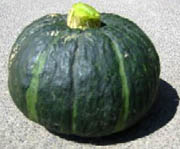Kabocha Squash Nutrition Facts
and Health Benefits

Youíve probably tried a number of squash varieties in your lifetime including such favorites as butternut, yellow, zucchini, acorn and spaghetti squash. But one you may have encountered is kabocha squash. This less well-known form of squash has a variety of health benefits that make it a winning choice for the dinner table.
What is Kabocha Squash?
Kabocha squash is a type of Japanese squash that resembles butternut squash in taste. The outside of this unimpressive-appearing squash resembles a pumpkin in shape, but it has a roughly textured green outer-skin, which opens up to reveal a brilliant orange interior. Itís often used in Thai cuisine and to make vegetable tempura in Japanese restaurants.
Kabocha Nutrition Data
Kabocha is a low carb alternative to butternut squash. A single cup of kobocha squash has only forty calories per cup compared to butternut squash, which has 60 calories. It has less than half of the carbs of butternut squash (7 grams vs. 16 grams) per one cup serving.
Despite its lower calorie and carb count, kabocha squash is an excellent source of beta-carotene, which can be converted to vitamin A in the body. Vitamin A is important for healthy white blood cells, for good immunity and for healthy night vision — and a serving of kabocha squash provides 70 percent of the dayís recommended requirements. It also helps to keep skin and hair healthy.
Beta-carotene is a powerful antioxidant and anti-inflammatory and is a good source of iron, vitamin C and some B vitamins. In addition, it contains fiber, which most Americans donít get enough of. To boost the fiber content even more, cook it with the edible skin still on.
How to Get the Health Benefits of Kabocha Squash
It tastes delicious diced into cubes and roasted in the oven, or pureed and made into a delicious soup thatís both hearty and filling. Sautee it with onions and spices for a tasty side dish. Use it where you would normally use butternut squash, and youíll get the same sweet taste with less calories and carbs.
The Bottom Line?
Most natural food markets such as Whole Foods carry kabocha squash, but you can also find it in many mainstream supermarkets. Give this sweet but healthy squash a try.
Author: Dr. Kristie Leong, MD.
|